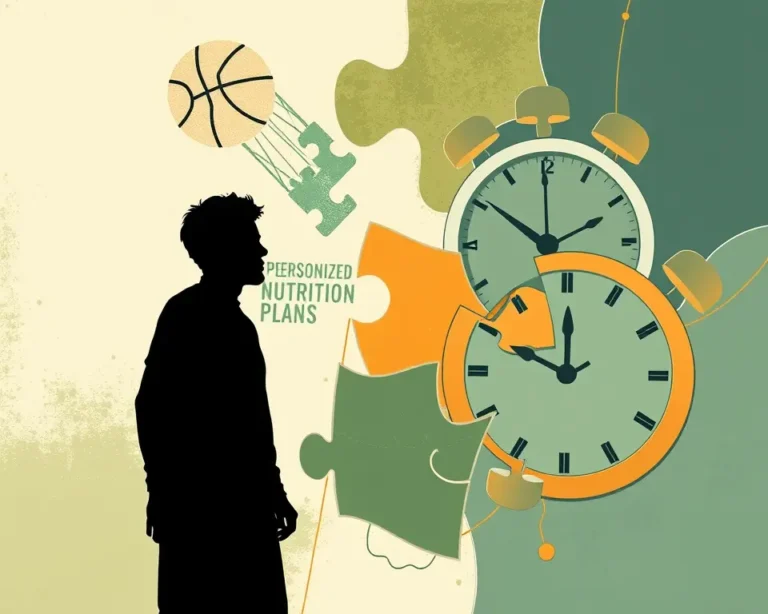LeBron James, a name synonymous with basketball excellence, has recently revealed a unique aspect of his training regimen: he doesn’t eat a full meal until after practice, typically around 1:30 or 2:00 p.m. This revelation has sparked considerable interest, with many wondering if this approach could be the key to unlocking their own athletic potential. However, health professionals are urging caution, suggesting that mimicking James’s fasting workout routine may not be suitable—or even healthy—for the average person.
What LeBron’s Diet Actually Looks Like
In a recent episode of the “Mind the Game” podcast, James shared his daily routine, explaining that he typically consumes a green juice or some fruit before his first full meal, which occurs well after his practice session. “I have either a green juice or some fruit or whatever the case may be, but I don’t eat a full meal until I get back home after practice. My first meal is usually around 1:30, 2 o’clock,” James said. While this approach appears to work for the 40-year-old athlete, who has maintained peak performance for over two decades, experts warn that it’s not a one-size-fits-all solution.
The Expert Consensus: Proceed with Caution
Registered dietitian Melissa Mitri of Welltech cautions that this type of nutrition routine is “not ideal for most active individuals.” She explains that a large body of research supports fueling both before and after exercise for optimal performance, recovery, and muscle-building benefits. Exercising on an empty stomach forces the body to use up carbohydrate reserves in the muscles and brain, potentially leading to fatigue, brain fog, and physical weakness. “Depending on the amount of glycogen a person has, they can become depleted very quickly or more slowly,” Mitri added.
Potential Risks of Fasted Workouts
- Reduced Performance: Exercising without adequate fuel can lead to decreased energy levels and impaired athletic performance.
- Brain Fog and Fatigue: The brain relies on glucose for energy, and a lack of fuel can result in cognitive impairment and fatigue.
- Muscle Loss: When the body is deprived of carbohydrates, it may turn to muscle tissue for energy, potentially hindering muscle growth and recovery.
- Mood Swings and Irritability: Low blood sugar levels can lead to irritability and mood swings.
- Increased Cortisol Levels: Fasting can trigger a cortisol response, potentially contributing to feelings of anxiety.
Why It Works for LeBron (And Why It Might Not Work for You)
Mitri acknowledges that James may be an exception, suggesting that his body has likely adapted over time to this fasted training method. “There is a small subset of people like LeBron that may perform well under fasting conditions, such as those who have a large amount of glycogen stores to pull from for energy.” She suggests that it likely took time for his metabolism to adjust to exercising in a fasted state, possibly enduring a dip in performance during the adjustment period.
Factors That Make LeBron’s Case Unique
- Elite Athlete Status: James is an elite athlete with exceptional physical conditioning and access to top-notch medical and training resources.
- Years of Adaptation: His body has likely adapted to this routine over years of consistent training and dietary adjustments.
- Glycogen Stores: He may possess a large amount of glycogen stores, allowing him to perform well even in a fasted state.
- Professional Guidance: James likely works closely with a team of nutritionists and trainers who monitor his health and performance.
The Importance of Fueling for Optimal Performance
Research consistently demonstrates the benefits of pre- and post-workout nutrition for active individuals. Fueling before exercise provides the body with the energy it needs to perform at its best, while post-workout nutrition aids in muscle recovery and replenishment of glycogen stores.
Benefits of Pre-Workout Fueling
- Increased Energy Levels: Provides the body with readily available energy to power through workouts.
- Improved Performance: Enhances strength, endurance, and overall athletic performance.
- Reduced Muscle Breakdown: Helps spare muscle tissue by providing an alternative energy source.
- Enhanced Focus: Supports cognitive function and mental focus during exercise.
Benefits of Post-Workout Fueling
- Muscle Recovery: Provides the necessary nutrients to repair and rebuild muscle tissue.
- Glycogen Replenishment: Replenishes glycogen stores depleted during exercise, preparing the body for future workouts.
- Reduced Muscle Soreness: Helps minimize muscle soreness and stiffness after exercise.
- Improved Adaptation: Supports long-term training adaptations and performance gains.
A More Sustainable Approach to Fitness Nutrition
Instead of blindly copying LeBron James’s diet, health professionals recommend a more sustainable and personalized approach to fitness nutrition. This includes:
- Consulting with a Registered Dietitian: A registered dietitian can assess your individual needs and goals, and develop a customized nutrition plan that aligns with your lifestyle and training regimen.
- Prioritizing Whole Foods: Focus on consuming a balanced diet rich in whole, unprocessed foods, including fruits, vegetables, lean proteins, and whole grains.
- Fueling Before and After Exercise: Consume a pre-workout snack or meal to provide energy for your workout, and a post-workout meal to aid in recovery.
- Staying Hydrated: Drink plenty of water throughout the day, especially before, during, and after exercise.
- Listening to Your Body: Pay attention to how your body responds to different foods and adjust your diet accordingly.
The Dangers of Copying Professional Athletes’ Diets
Copying the diets of professional athletes can be risky for several reasons:
- Individual Needs Vary: Athletes have unique nutritional needs based on their sport, training intensity, and individual physiology.
- Potential for Nutrient Deficiencies: Restrictive diets can lead to nutrient deficiencies, which can negatively impact health and performance.
- Risk of Disordered Eating: Obsessively following a rigid diet can increase the risk of disordered eating patterns.
- Unrealistic Expectations: Athletes often have access to resources and support systems that are not available to the average person.
Understanding LeBron’s Training Principles
While his specific fasting routine might not be universally applicable, some of LeBron James’s broader training principles can be beneficial for anyone:
- Lift Weights to Get Stronger: James focuses on improving general strength and conditioning in the weight room.
- Emphasize Core, Balance, and Flexibility: He understands the importance of a strong core, good balance, and flexibility for overall athleticism and injury prevention.
- Focus on Recovery: Physical and mental recovery are critical components of his training regimen, including sleep, advanced technology, and treatments like massages and stretching.
- Stay Consistent: James is consistent with his training and daily routine, which is key to long-term success.
Intermittent Fasting: A Closer Look
Intermittent fasting (IF) has gained popularity as a weight-loss strategy, but it’s essential to understand its potential benefits and drawbacks. IF involves cycling between periods of eating and voluntary fasting on a regular schedule. While some studies suggest that IF may promote weight loss and improve metabolic health, it’s not suitable for everyone.
Potential Benefits of Intermittent Fasting
- Weight Loss: IF can help reduce calorie intake and promote fat burning.
- Improved Insulin Sensitivity: IF may improve insulin sensitivity, which can help regulate blood sugar levels.
- Cellular Repair: Some studies suggest that IF may promote cellular repair and autophagy.
- Brain Health: IF may have neuroprotective effects and improve cognitive function.
Potential Drawbacks of Intermittent Fasting
- Nutrient Deficiencies: Restricting eating windows can make it challenging to obtain all the necessary nutrients.
- Muscle Loss: IF may lead to muscle loss if not combined with adequate protein intake and resistance training.
- Hormonal Imbalances: IF can disrupt hormone levels, particularly in women.
- Eating Disorders: IF may trigger or exacerbate disordered eating patterns.
- Not Suitable for Everyone: IF is not recommended for pregnant or breastfeeding women, individuals with a history of eating disorders, or those with certain medical conditions.
The Importance of a Nutritious Diet
Regardless of whether you choose to follow an intermittent fasting protocol, prioritizing a nutritious diet is crucial for overall health and athletic performance. A well-balanced diet should include:
- Lean Proteins: Essential for muscle building and repair. Good sources include chicken, fish, beans, and lentils.
- Complex Carbohydrates: Provide sustained energy for workouts. Opt for whole grains, fruits, and vegetables.
- Healthy Fats: Important for hormone production and overall health. Choose sources like avocados, nuts, and olive oil.
- Vitamins and Minerals: Essential for various bodily functions. Ensure you consume a variety of fruits and vegetables to meet your micronutrient needs.
- Fiber: Promotes digestive health and helps regulate blood sugar levels. Found in whole grains, fruits, and vegetables.
Listen to Your Body
The most important thing is to listen to your body and find a nutrition plan that works for you. Pay attention to how different foods and eating patterns affect your energy levels, performance, and overall well-being. If you experience any negative side effects, such as fatigue, muscle loss, or mood swings, adjust your diet accordingly or consult with a healthcare professional.
The Bottom Line
While LeBron James’s dedication to fitness is admirable, his specific dietary routine may not be suitable for everyone. It’s essential to prioritize a balanced diet, fuel your body appropriately for exercise, and listen to your body’s signals. Consulting with a registered dietitian can help you develop a personalized nutrition plan that supports your individual goals and promotes long-term health and performance. Remember, what works for a world-class athlete may not work for you, and it’s always best to prioritize your own well-being.







